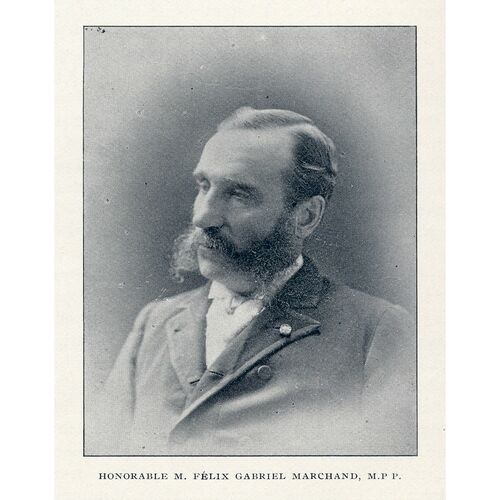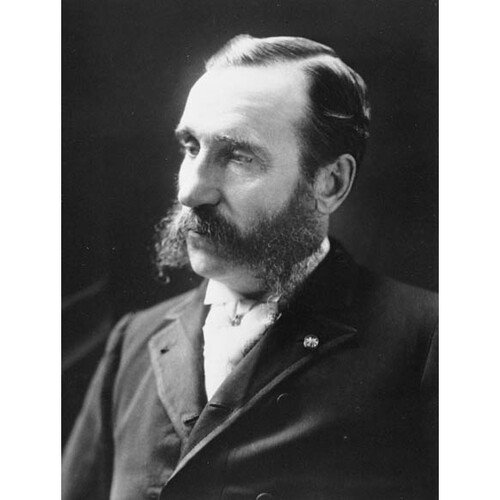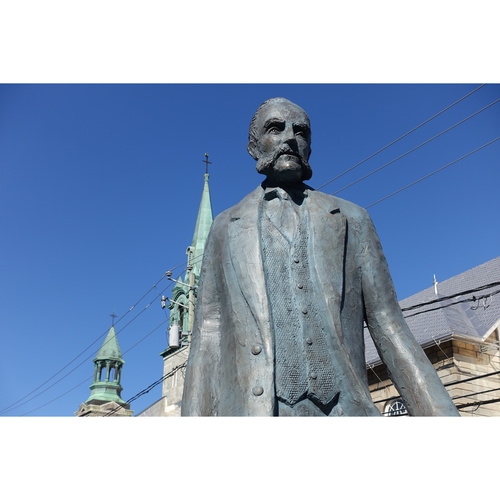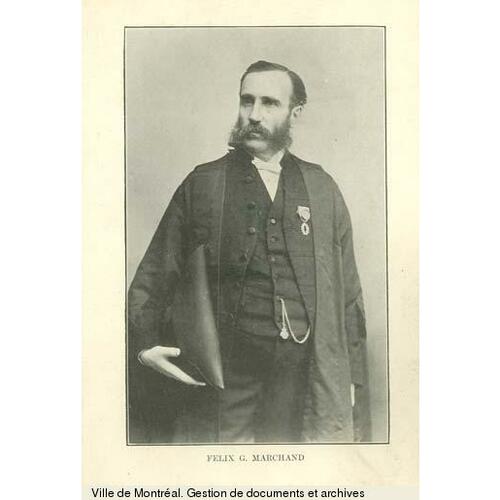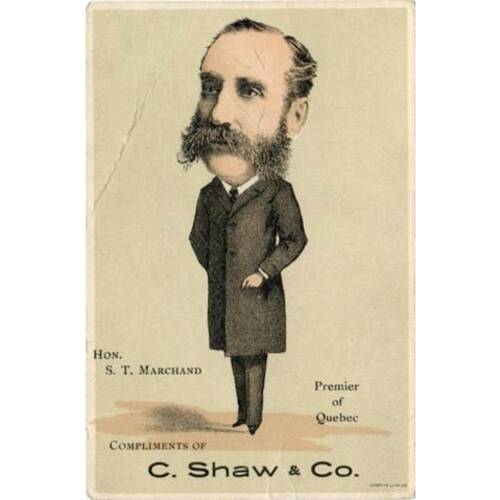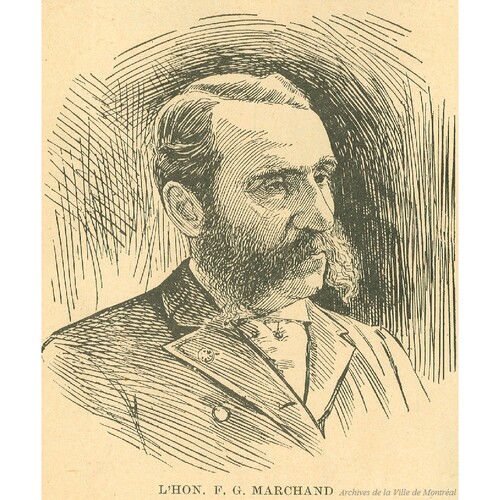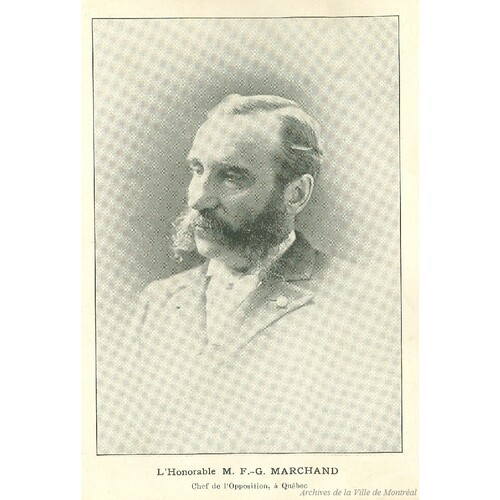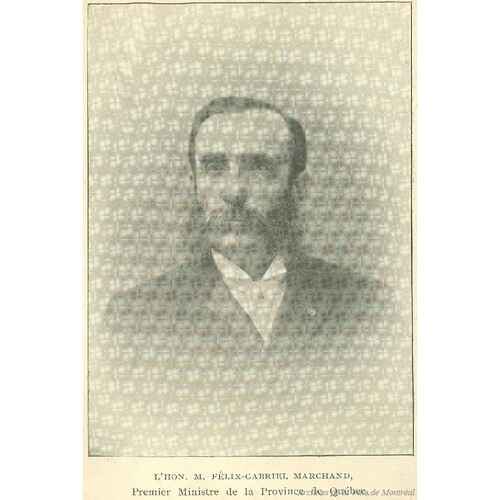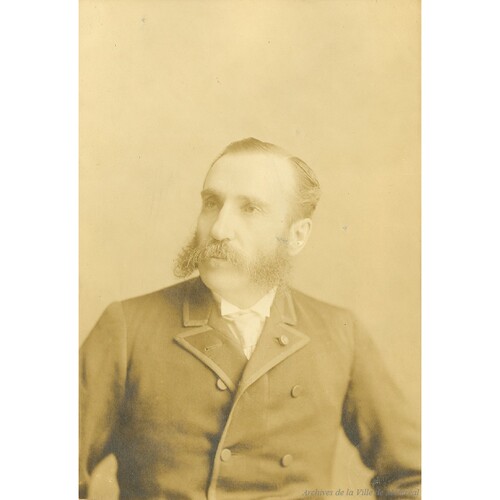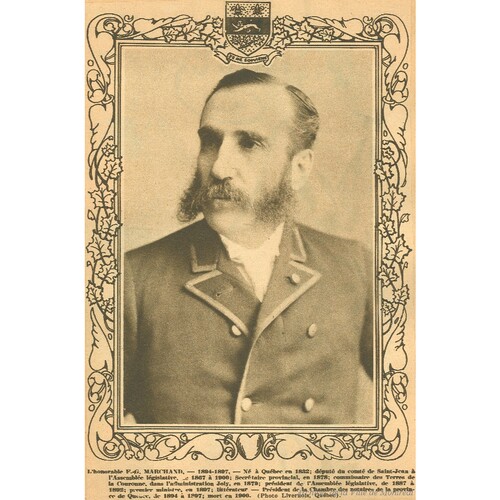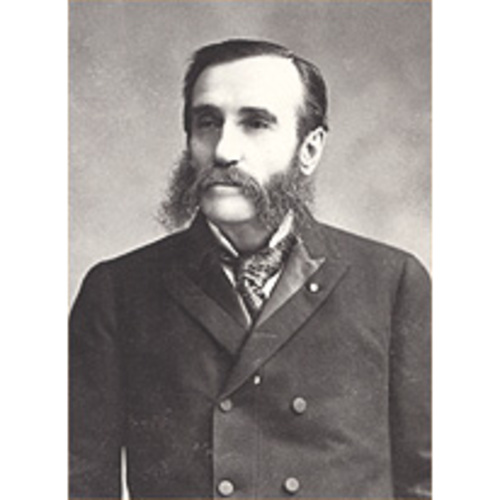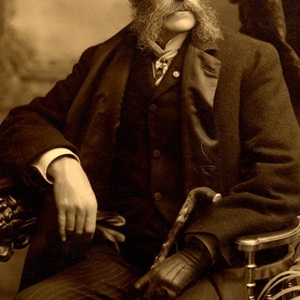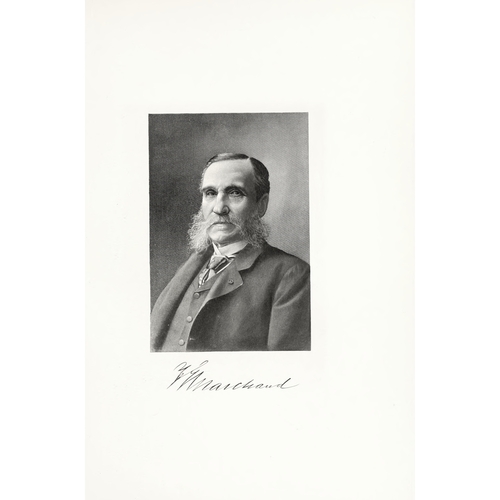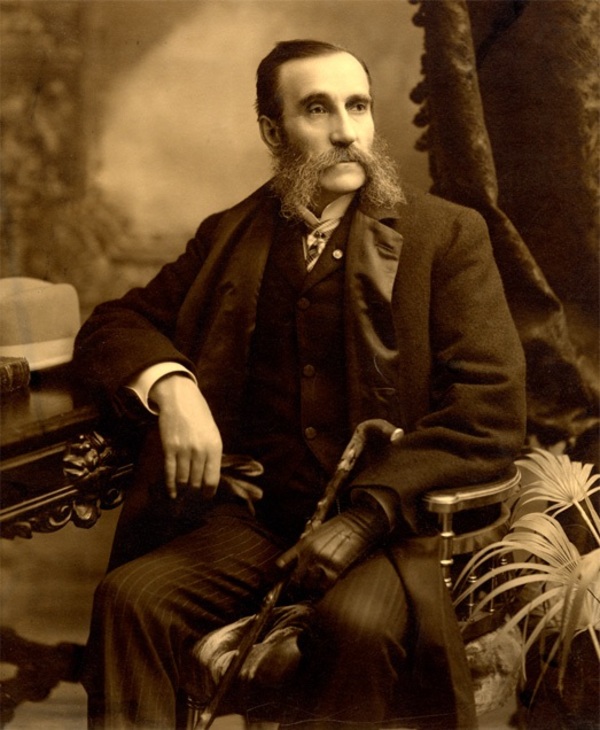
Source: Courtesy of Wikimedia Commons
MARCHAND, FÉLIX-GABRIEL, farmer, notary, politician, publisher, journalist, militia officer, and writer; b. 9 Jan. 1832 in Dorchester (Saint-Jean-sur-Richelieu), Lower Canada, son of Gabriel Marchand* and Mary Macnider; m. 12 Sept. 1854 Hersélie Turgeon in Terrebonne, and they had 11 children; d. 25 Sept. 1900 in Quebec City and was buried on the 29th in Belmont cemetery at Sainte-Foy (Quebec City).
Félix-Gabriel Marchand spent his childhood on the Beauchamps estate, near the village of Dorchester, where his father had settled after making his fortune as a lumber merchant. Mary raised him in the English language and Gabriel imbued him with a love of country, of Catholicism, and of farming. Living in a family with a home wide open to friends taught him tolerance and courtesy. He began his studies in an English primary school, and then, in 1843, was enrolled by his father in the Collège de Chambly to learn French. From 1845 to 1849 Marchand attended the Séminaire de Saint-Hyacinthe, where he received an education influenced by Catholic liberalism and sympathetic to current trends.
Marchand decided to enter the notarial profession. On 18 Feb. 1850 he began his training at Saint-Jean (Saint-Jean-sur-Richelieu), as Dorchester was now known, under Thomas-Robert Jobson. In May, Marchand’s father allowed him to go on a trip to Europe. He visited Marseilles, spent two months in Paris, and by mid August was in Glasgow. Returning home in September, he continued as a clerk under Jobson. His father died in 1852, and in the summer of 1853 Marchand inherited his estate. He married the following year and settled down with his wife at Beauchamps. Licensed as a notary on 20 Feb. 1855, Marchand opened an office at Saint-Jean, and on 1 March he signed the first of the 6,324 notarial acts he was to draft in the course of his career.
Marchand divided his time between his practice and the Beauchamps estate, which he wanted to convert into a model farm using the most up-to-date practices. His stables had the finest racehorses in the district. Through the influence of his family, his profession, and his participation in agricultural societies, he gradually built the reputation that facilitated his entry into public life. He was elected a municipal councillor for Saint-Jean in January 1858, treasurer of the Board of Notaries for the district of Iberville in 1860, president of the local agricultural society the following year, and chairman of the school commission for the parish of Saint-Jean-l’Évangéliste in 1863. In addition, he followed provincial politics closely. He associated with the Rouges, in particular François Bourassa. But because of his family tradition and his schooling he felt more at ease with moderate Liberals such as Louis-Amable Jetté* and Charles Laberge*, given their deep-rooted attachment to church, democracy, and nation. As a response to the condemnation of the Institut Canadien by Bishop Ignace Bourget* in the spring of 1858, these Liberals had joined together and founded the Institut Canadien-Français.
It was within this organization that the moderate Liberals refined their political theories and sought a middle ground between the Bleus and the Rouges, and it was probably here that the idea of a newspaper was born. In 1860, with his friend Laberge and Isaac Bourguignon, Marchand founded Le Franco-Canadien, a semi-weekly publication purporting to be the Liberal voice in the region of Saint-Jean-sur-Richelieu. Drawn up by Marchand, its prospectus promised an analysis of political events from a Catholic and French Canadian viewpoint.
In 1861 the Trent affair muted political rivalries [see Sir Charles Hastings Doyle*]. Fearing hostilities with the United States, the government reinforced the militia. Saint-Jean, which was close to the border, was in a state of excitement. On 19 Dec. 1862 Marchand and Laberge issued a call, in the name of national honour, for volunteers to form a company of infantry militia. Other companies sprang up and on 23 May 1863 they were amalgamated as the 21st Battalion Volunteer Militia Infantry. Marchand was made captain of the second company. He rose quickly through the ranks and on 22 June 1866 became lieutenant-colonel and battalion commander. There was no open conflict with the United States as a result of the Trent affair, but the 21st was called up in June 1866 and again in the spring of 1870 for duty on the border in the face of a threatened Fenian invasion.
As talk of war subsided over time, the game of politics resumed. Le Franco-Canadien campaigned against the proposed confederation of the colonies of British North America, aligning itself in this regard with the political views of Antoine-Aimé Dorion. In the spring of 1867, in a series of articles written after long deliberation, Marchand reiterated his preference for a federation with certain powers delegated to a central government, rather than the reverse. When confederation came on 1 July, Marchand rallied to the new régime, but he resolved that he would “strive, through reforms effected in a constitutional manner, to give it the true characteristics of a federal system.” It was with this commitment in mind that he sought election to the Legislative Assembly for Saint-Jean. The campaign proved dull. His opponent Isaïe Bissonnette, from L’Acadie, shared his political views, and the contest degenerated into rivalry between Saint-Jean and certain rural parishes. Voting took place on 19 and 20 September and Marchand won.
At the opening of the first session of the assembly on 27 Dec. 1867 Marchand joined a crowd of little-known members. About 70 per cent of them came from the liberal professions and had no parliamentary experience. Party discipline was lax, especially among those Liberals who hoped that people of goodwill would unite in the public interest. Fourteen members declared themselves Liberals and ready to serve as the loyal opposition to the government of Pierre-Joseph-Olivier Chauveau*, who enjoyed the support or the favourable consideration of some 50 members. The atmosphere was relaxed. Chauveau was conciliatory, and Henri-Gustave Joly*, unofficial leader of the opposition, courteous.
Marchand took his place with the opposition, and became known more as a man of ideas and principles than as a party politician. He articulated his fundamental stance in March: “No intolerance, no persecution, but our legitimate share of power according to our numbers, and nothing less.” He had no set political agenda, but his hope for a union of those committed to the common good sprang from a particular concern that agriculture and farming should be improved in order to discourage emigration, as well as from two other clear aims: reductions in public spending and an assembly freed from the machinations of pressure groups and from the centralizing ambitions of the federal government. Experience with the parliamentary system led him to alter his views on the workings of party politics. He aligned himself with Joly, who sought to form the opposition into a well-organized political party. He worked with Joly, Pierre Bachand*, Édouard Laberge, Louis Molleur*, and Victor Robert as a team. When the caucus in March 1869 officially chose Joly as leader of the opposition, Marchand, now his close friend, sat at his side facing the premier and was generally recognized as his second in command. In the 1871 election, the victory of radical Liberals such as Luther Hamilton Holton*, Télesphore Fournier, and Maurice Laframboise* helped define the opposition as a separate entity, and by 1875 it would have a political organization firmly established in Montreal, Quebec City, and Saint-Hyacinthe. But Marchand would never be comfortable with the constraints of party politics. In December 1871 he lent his support to Honoré Mercier, who was trying to break free from the Bleus and the Rouges by establishing the Parti National at the federal level.
In the years 1867 to 1875 Marchand spoke regularly in the assembly. “Tall, slender, [and] svelte,” he had, Auguste Achintre* said, “the bearing of a cavalry officer, the ingratiating manners of a notary, the impassiveness of a judge, and the intellect of a man of letters.” As an mla, he proved assiduous, hardworking, level-headed, persistent, concerned for the common good, and respectful of others. Gradually he gained recognition as a speaker, not by eloquence but by his knowledge of subjects under discussion, by his high-mindedness, and by the wit and word-plays with which he amused the house. He spoke on questions specifically related to his constituency, the notarial profession, and public finance; but the two problems closest to his heart were those of the double mandate and colonization. On 23 Jan. 1868 he introduced a bill for the abolition of the double mandate. He stressed three things: the pressure that the federal government could exert on the assembly through members who also held a seat in the House of Commons; the false position of these members, who could vote at the provincial level on legislation over which they had a veto at the federal level; and the delays in the proceedings of the provincial assembly occasioned by their prolonged stays in Ottawa. Marchand’s bill was defeated, but he reintroduced it year after year until it was finally passed in January 1874. Colonization was another matter that Marchand addressed every year. He placed it in the context of French Canadian emigration to the United States, although the view he took of the issue was a narrow one that obscured the economic forces at work in North America. The emigrants, in his opinion, were neither adventurers nor idlers, but rather young people in search of work or fathers anxious to provide for their children. He maintained that judicious initiatives on the part of the government could stem this migratory movement. On 21 Jan. 1869 he proposed that the agricultural societies be converted into colonization societies financed by the government and the public and endowed with tracts that they would equip with a system of roads and divide into lots to be granted to settlers free of charge. The bill was defeated, but it was subsequently to inspire the government’s colonization policy.
During this period parliamentary sessions lasted around 40 days, in general from November to February. The members assembled at 3:00 p.m. and remained until 6:00 p.m., although, when the need arose, they would reconvene in the evening from 7:30 to 11:00. Four key events marked the sessions – the speech from the throne, the debate on the address, the budget speech, and prorogation. Slow-moving at first, the sessions ended in a race, with bills being put to the vote at top speed. The pace left Marchand with moments of leisure, when he sometimes felt melancholy: he missed his wife and children a great deal. The companionship of Bachand, reading, and writing literary pieces or articles for Le Franco-Canadien helped to fill these lonely stretches.
In the autumn of 1869 Marchand moved his family into a magnificent two-storey brick house he had built in Saint-Jean on Rue Saint-Charles, just opposite the home of his friend Laberge. In December he set up office in the house; in February 1872 he sold his farm to his brother Charles-Jubilé. Breaks between sessions gave him time to be with his family, to renew contacts with his constituents, and to involve himself in local affairs. In January 1868 he accepted the office of churchwarden for the parish of Saint-Jean-l’Évangéliste, and in December he and his friend Louis Molleur helped establish the Société Permanente de Construction du District d’Iberville. He was elected representative for the district of Iberville to the Provincial Board of Notaries in February 1870, and in 1872 he was made chairman of the Saint-Jean school commission. The following year, once again with Molleur, he helped found the Banque de Saint-Jean, on whose board he sat from 1873 to 1879. He also participated on 17 Oct. 1874 in setting up the Compagnie Manufacturière de Saint-Jean, of which he remained a director until it closed down in 1877.
In 1874, in the midst of an economic depression, the Quebec government adopted a policy of railway subsidies. The move was the beginning of a series of public loans which were to drain the treasury, and of an era of political manœuvring besmirched with scandals. Although Marchand recognized that railways were essential to the growth of the provincial economy, true to form he never ceased, session after session, to sound warnings against certain risks inherent in the policy and the general skulduggery involved in implementing it, particularly in regard to the government takeover of the lines that became the Quebec, Montreal, Ottawa and Occidental Railway [see Louis-Adélard Senécal*]. In 1876 Marchand and Joly estimated that the railway would cost $9,800,000 and that disaster was imminent. The crisis came in 1877: the municipalities, angry at a re-routing of the line, refused to pay their promised share of the cost. On the verge of bankruptcy, the Conservative government of Charles Boucher* de Boucherville resorted to direct taxation and attempted to force the recalcitrant municipalities into compliance. The Liberal opposition grew more vehement in its attacks. Marchand brandished the “spectre of the Reign of Terror,” and termed a bill to bring the municipalities to heel “unjust and pointless” as well as full of “iniquitous and vexatious clauses.”
The crisis led Lieutenant Governor Luc Letellier* de Saint-Just to dismiss the ministry and ask Joly to form the government on 2 March 1878. Marchand was sworn in as provincial secretary on 8 March and as commissioner of crown lands the following year on 19 March. The Liberals, unable to command a solid majority in the house, settled for a policy of railway building, budgetary constraints, and a reduction in the civil service that included doing away with the provincial police. On 4 June 1878 Marchand proposed, without success, that the Legislative Council be abolished. The following year he committed a blunder in selling to Hammond Gowen for $5,000 a piece of land which had been evaluated at $17,000, not realizing that Gowen was related to the premier. The Conservatives cried scandal, but a legislative committee held that Marchand had acted in good faith and that he had made a questionable decision but not one sufficiently serious to tarnish his reputation. This pronouncement did little to sustain the Joly administration, which crumbled on 29 Oct. 1879 when five members of the assembly, skilfully influenced by Joseph-Adolphe Chapleau, changed sides.
Marchand was not in the running to succeed Joly, having never stood out as a man of the people. He lacked charisma. The Liberals quite naturally rallied behind Mercier and chose him as party leader in 1883. Marchand settled for the role of faithful second in command, which permitted him longer stays at Saint-Jean and left time for his writing. Up to this point, he had mainly worked as a journalist and had published several minor volumes: Fatenville (1869), a comedy, and Erreur n’est pas compte ou les inconvenients d’ une ressemblance (1872), a vaudeville piece. These books earned him the title of Officier de l’Instruction Publique (1879), an honour conferred by France, and in 1882 the distinction of being a charter member of the Royal Society of Canada. Then came years of prolific literary output. In 1883 he published a comedy in prose, Un bonheur en attire un autre, followed in 1884 by another comedy, Les travers du siècle. The next year was especially productive, with Les faux brillants, a comedy in verse, and L’aigle et la marmotte, a fable. In 1889 he published a prose piece entitled Nos gros chagrins et nos petites misère, and in 1899 Le lauréat, a comic opera.
The characters Marchand brought to the stage were somewhat lacking in psychological depth and often entangled in unlikely situations and fantastic plots. His aim was to entertain and to portray a world in which an ever-present justice rewards virtue and punishes wrongdoing – a theme that literary critic Jean Du Berger says is “the traditional model to which every nascent literature falls heir.” The public enjoyed his humour and his sense of caricature. His work received official recognition: he was made a member of the Académie des Muses Santones (France) in 1883; the Université Laval awarded him a doctorat ès lettres in 1891; and he was elected president of the Royal Society of Canada in 1897.
Marchand carried on his literary and political activities at the same time. In July 1883, to counter the radicals of La Patrie who rejected Mercier’s leadership, he founded Le Temps with Mercier and Toussaint-Antoine-Rodolphe Laflamme, becoming its editor. When La Patrie adopted the same stance, Le Temps ceased publication on 15 October. From 1882 to 1885 Marchand backed Mercier both in the assembly and on public platforms. He stood with him throughout the upheaval of the Riel affair in 1885 [see Louis Riel*], lending his approval to the Métis uprising on the grounds that the Métis “had exhausted all constitutional means,” and he triumphed with Mercier in the elections of 14 Oct. 1886.
Although in line for a cabinet post, Marchand was offered the speakership of the assembly by Mercier, evidence that although he commanded respect he was not a strong party man. His role as speaker held him above party concerns and apart from the hectic lives of the ministers. Marchand performed his function with dignity, kindliness, and impartiality. One parliamentary journalist claimed that under him the members probably enjoyed the five “most refined” sessions since 1867. Behind the scenes, however, Marchand made known to Mercier his disapproval of the lavish spending and the politics of grandeur that characterized the régime. He had the poet’s intuition of things to come. In the autumn of 1891, the Baie des Chaleurs scandal compromised the government and discredited Mercier. Lieutenant Governor Auguste-Réal Angers* dismissed Mercier on 16 Dec. 1891. The Bleus and the Rouges washed their dirty linen in public during the bitter electoral campaign in the winter of 1891–92. As speaker of the house, Marchand claimed to be the “guardian . . . [of] the dignity and the prerogatives of the Legislative Assembly, bound by duty to protect them.” He denounced the “arbitrary and unconstitutional” conduct of the lieutenant governor. The speakership provided him with a convenient excuse for dissociating himself from the machinations of certain Liberals. He was re-elected on 8 March by a margin of only 167 votes and then brought his opponent, Jacques-Emery Molleur, before the courts for libel. Marchand escaped with an untarnished reputation, but not so the Liberal party, which came out of the election tainted with scandal, sharply reduced in numbers, and without a leader. The time had come to rebuild, and in their darkest hour the Liberals looked to Marchand, the doyen and conscience of the party, to accomplish the task.
Now 60 years old, Marchand, as the senior member of the party, was affectionately called “Père Marchand.” He had left his great days in politics behind. On a first impression he seemed unruffled and cold, but in private he revealed himself as kindly, unaffected, and courteous. In public he spoke in terms of reason. According to his son-in-law, Raoul Dandurand*, he was no orator: “He spoke very correctly, but with no animation.” His serene bearing and general air of goodwill were well received, but he was criticized for speeches lacking in vigour. With his conciliatory but firm character, lofty intellect, irreproachable conduct, and politics devoted to the common good, Marchand projected an image of unadventurous decency. He was no visionary; he was not, indeed, a party man, nor did he have what it took to rally others to a common cause. Rather, he was a proud patriot and a Liberal of the old school, who would let the destinies of men be decided in the market-place and focus on ensuring respect for the rules of upright conduct as well as for the rights of his own culture. In his opinion, the legislators’ task was to manage the country’s affairs. He had several assets: an intimate knowledge of provincial political life and of parliamentary strategies; the esteem of Wilfrid Laurier*, the leader of the federal Liberal party, as well as of his adversaries; and the state of confusion in the young guard of the party, including Charles Fitzpatrick*, François-Gilbert Miville Dechêne, Adélard Turgeon*, Rodolphe Lemieux*, and the brothers Jules and Auguste Tessier, who saw in Marchand the man for a period of transition.
Agreeing to serve as opposition leader, Marchand made it his chief objective to restore the credibility of the Liberal party and to undermine that of its adversary. In answer to the Conservative policy of direct taxation and loans to balance the budget, he proposed a policy of budgetary constraints, which included abolition of the Legislative Council, cutbacks in the civil service, and severe reductions in ministerial spending. The sale of the Asile de Beauport (1893–94), the raising in Paris of a loan to the government (1893), and the resignation of treasurer John Smythe Hall* (1894) gave rise to heated debates in the course of which Marchand decried the absence of a coherent or effective financial policy. On 11 Dec. 1895 he gave a ringing and well-documented speech, painting the state of the province’s finances in the darkest colours and proposing a party truce for the common good.
Marchand skilfully developed the thrust of his forthcoming election campaign: denunciation of the Conservative “politics of expediency and opportunism.” This message was to have great impact on the voters at a time when under Louis-Olivier Taillon* the provincial Conservatives, still caught in the McGreevy scandal [see Thomas McGreevy], were projecting the image of a party on the verge of disintegration. The Liberals were in full sail. Laurier’s popularity was at its zenith and his victory in the federal election of 23 June 1896 augured well for Marchand. Eager to take full advantage of the Liberal sweep, he went around the province in the autumn of 1896 and on 28 November held a great rally of Liberal party organizers in Montreal. Laurier’s men in fact pulled the strings, and the young guard fiercely carried on the fight. As campaign manager, Dandurand set up Liberal clubs throughout the province and maintained contact between Laurier and Marchand. From his retreat at Spencer Wood, Chapleau worked in vain for a coalition of the Bleus and the Rouges – clearly excluding the ultramontanes – to be led by his friend Guillaume-Alphonse Nantel*. The election campaign of the spring of 1897 degenerated into a battle between Laurier and “the cabinet of tax-gatherers” – the label popularly stuck on the Conservative government – with Marchand wielding little influence over its outcome. On 11 May the Liberals won and on the 24th Marchand was sworn in as premier.
Carried into power on Laurier’s popularity, at a time when the prime minister leaned towards currying favour with the Catholic bishops and reassuring the electorate, Marchand did not have free rein in forming his cabinet. Clearly, where the provincial cabinet was concerned, Laurier had the upper hand. After moving with his wife to Quebec City and settling in with his son-in-law Arthur Simard* at 25 Rue Sainte-Ursule (the property in Saint-Jean would be sold to Dandurand in January 1898), Marchand began laying the groundwork for carrying out his election promises: to balance the budget, develop natural resources, and reform the system of public education.
Marchand’s absolute integrity, an economy on the rise, the demand in the United States for raw materials, and a new wave of industrialization based on electricity all conduced to a realization of the election promises. Marchand managed to tighten provincial purse-strings and even to announce slight surpluses. Impervious to demands on the public coffers – except, of course, those recommended by his friend Laurier – he kept his eye firmly fixed on the “balance sheet,” running the provincial administration like a bank manager. There were signs of growth in manufacturing, the dairy industry, and pulp and paper, and new urban centres such as Shawinigan and Grand-Mère were springing up.
But when it came to the educational system, Marchand met with resounding failure. During his election campaign he had outlined reforms which he said would leave the Council of Public Instruction with “absolute control over everything but the administration of material [aspects]” but would entrust to a minister accountable to the assembly “the management and administration of the physical [operations] within the school system” and therefore the responsibility of ensuring “the smooth and efficient running of the common schools.” Marchand had definite objectives: the improvement of education through better teacher training and a system of school inspection; uniform textbooks; and a reduction in tuition fees through increased grants to the common schools. It was a moderate plan, falling far short of the demands of the radicals, but it was viewed as positively dangerous by the ultramontane bishops, who jealously guarded the privileges they had acquired. Marchand got his bill passed in the assembly on 5 Jan. 1898 and it was then sent to the Legislative Council for scrutiny. The archbishop of Montreal, Paul Bruchési*, who was opposed to the bill and had tried in vain to rally Pope Leo XIII to his cause, was not prepared to give in. He enlisted the support of the bishops and charged Thomas Chapais* with the task of blocking the bill in the Legislative Council. On 10 January the councillors rejected it. Two days later Marchand produced a new proposal, which in fact was largely a codification of the existing school laws.
Marchand suffered from arteriosclerosis, and the defeat, with its accompanying political agony, had undermined his health. He had to work at a slower pace, but was preparing his revenge. On 9 March 1900 he presented a bill to abolish the Legislative Council, arguing that the councillors represented private interests rather than a social class or public opinion, and that they were creatures of political patronage. Feeling unwell, he was unable to complete his speech and withdrew from the assembly. In May he was forced to cease working altogether, and in September a relapse left him confined to bed. He died at his son-in-law’s home in Quebec City on 25 September, leaving his wife only a modest life insurance policy and a few personal effects. La Patrie paid tribute: “Integrity is in mourning, [our] ancient Honour wears the crape of sorrow.”
Félix-Gabriel Marchand collected his literary work in Mélanges poétiques et littéraires (Montréal, 1899). His Manuel et formulaire général et complet du notariat de la province de Québec (Montréal, 1891; 2e éd., 1892) and some of his political speeches have also been published.
AC, Québec, État civil, Catholiques, Notre-Dame de Québec, 29 sept. 1900. ANQ-M, CE6-24, 12 sept. 1854. ANQ-Q, P-174. Paul Bruchési, “Oraison funèbre de l’hon. M. F.-G. Marchand . . . ,” La Semaine religieuse de Montréal (Montréal), 36 (juill.–déc. 1900): 211–14. Débats de la législature provinciale (G.-A. Desjardins et al.). Débats de l’Assemblée législative (M. Hamelin). Le Canada français/Le Franco-Canadien (Saint-Jean-sur-Richelieu, Qué.), 1er juin 1860; 1er, 5, 8, 15, 26, 29 mars, 2, 5, 16 avril, 2 juill. 1867; 28 sept., 5, 12 oct. 1900. La Presse, 26 sept. 1900. Le Soleil, 26 sept. 1900. Auguste Achintre, Manuel électoral; portraits et dossiers parlementaires du premier Parlement de Québec (Montréal, 1871; réimpr., 1871). F.-M. Bibaud, Le panthéon canadien; choix de biographies, Adèle et Victoria Bibaud, édit. (nouv. éd., Montréal, 1891). Canadian album (Cochrane and Hopkins), vol.2. Canadian biog. dict., vol.2. Cyclopædia of Canadian biog. (Rose and Charlesworth). J. Desjardins, Guide parl. DOLQ, vol.1. Louis Garon, “Inventaire analytique du fonds Félix-Gabriel Marchand,” ANQ Rapport, 1974: 127–210. Réginald Hamel et al., Dictionnaire pratique des auteurs québécois (Montréal, 1976), 478–79. J. Hamelin et al., La presse québécoise, vols.1–4. Quebec directory, 1896–1901. RPQ. Wallace, Macmillan dict. Lionel Fortin, Félix-Gabriel Marchand (Saint-Jean-sur-Richelieu, 1979). Edmond Lareau, Histoire de la littérature canadienne (Montréal, 1874). Rumilly, Hist. de la prov. de Québec, vols.1–9. L.-P. Audet, “Le projet de ministère de l’instruction publique en 1897,” RSC Trans., 4th ser., 1 (1963), sect i: 133–61. Bernard Chevrier, “Le ministère de Félix-Gabriel Marchand (1897),” RHAF, 22 (1968–69): 35–46.
Bibliography for the revised version:
Bibliothèque et Arch. Nationales du Québec, Centre d’arch. du Vieux-Montréal, CE604-S10, 11 janv. 1832. La Justice (Québec), 18 déc. 1891.
Cite This Article
Michèle Brassard and Jean Hamelin, “MARCHAND, FÉLIX-GABRIEL,” in Dictionary of Canadian Biography, vol. 12, University of Toronto/Université Laval, 2003–, accessed December 16, 2025, https://www.biographi.ca/en/bio/marchand_felix_gabriel_12E.html.
The citation above shows the format for footnotes and endnotes according to the Chicago manual of style (16th edition). Information to be used in other citation formats:
| Permalink: | https://www.biographi.ca/en/bio/marchand_felix_gabriel_12E.html |
| Author of Article: | Michèle Brassard and Jean Hamelin |
| Title of Article: | MARCHAND, FÉLIX-GABRIEL |
| Publication Name: | Dictionary of Canadian Biography, vol. 12 |
| Publisher: | University of Toronto/Université Laval |
| Year of publication: | 1990 |
| Year of revision: | 2024 |
| Access Date: | December 16, 2025 |


